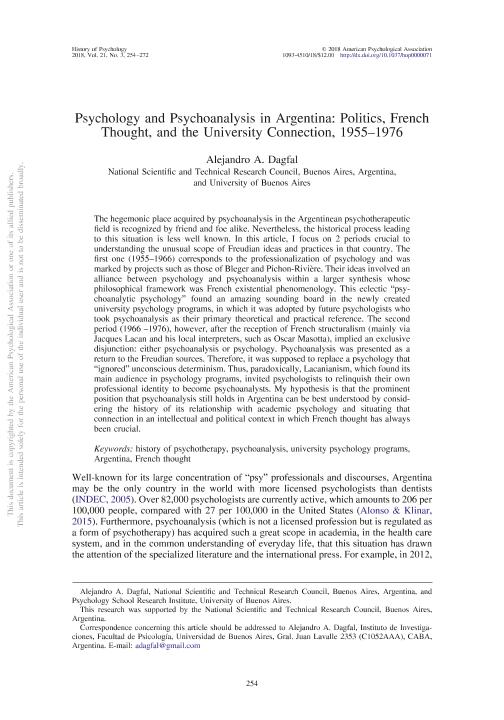Mostrar el registro sencillo del ítem
dc.contributor.author
Dagfal, Alejandro Antonio

dc.date.available
2022-04-20T17:14:07Z
dc.date.issued
2018-08
dc.identifier.citation
Dagfal, Alejandro Antonio; Psychology and psychoanalysis in Argentina: Politics, French thought, and the university connection, 1955–1976; American Psychological Association; History of Psychology; 21; 3; 8-2018; 254-272
dc.identifier.issn
1093-4510
dc.identifier.uri
http://hdl.handle.net/11336/155454
dc.description.abstract
The hegemonic place acquired by psychoanalysis in the Argentinean psychotherapeutic field is recognized by friend and foe alike. Nevertheless, the historical process leading to this situation is less well known. In this article, I focus on 2 periods crucial to understanding the unusual scope of Freudian ideas and practices in that country. The first one (1955–1966) corresponds to the professionalization of psychology and was marked by projects such as those of Bleger and Pichon-Rivière. Their ideas involved an alliance between psychology and psychoanalysis within a larger synthesis whose philosophical framework was French existential phenomenology. This eclectic “psychoanalytic psychology” found an amazing sounding board in the newly created university psychology programs, in which it was adopted by future psychologists who took psychoanalysis as their primary theoretical and practical reference. The second period (1966 –1976), however, after the reception of French structuralism (mainly via Jacques Lacan and his local interpreters, such as Oscar Masotta), implied an exclusive disjunction: either psychoanalysis or psychology. Psychoanalysis was presented as a return to the Freudian sources. Therefore, it was supposed to replace a psychology that “ignored” unconscious determinism. Thus, paradoxically, Lacanianism, which found its main audience in psychology programs, invited psychologists to relinquish their own professional identity to become psychoanalysts. My hypothesis is that the prominent position that psychoanalysis still holds in Argentina can be best understood by considering the history of its relationship with academic psychology and situating that connection in an intellectual and political context in which French thought has always been crucial.
dc.format
application/pdf
dc.language.iso
eng
dc.publisher
American Psychological Association

dc.rights
info:eu-repo/semantics/openAccess
dc.rights.uri
https://creativecommons.org/licenses/by/2.5/ar/
dc.subject
HISTORY OF PSYCHOTHERAPY
dc.subject
PSYCHOANALYSIS
dc.subject
UNIVERSITY PSYCHOLOGY PROGRAMS
dc.subject
ARGENTINA
dc.subject
FRENCH THOUGHT
dc.subject.classification
Otras Psicología

dc.subject.classification
Psicología

dc.subject.classification
CIENCIAS SOCIALES

dc.title
Psychology and psychoanalysis in Argentina: Politics, French thought, and the university connection, 1955–1976
dc.type
info:eu-repo/semantics/article
dc.type
info:ar-repo/semantics/artículo
dc.type
info:eu-repo/semantics/publishedVersion
dc.date.updated
2022-04-20T14:51:17Z
dc.identifier.eissn
1939-0610
dc.journal.volume
21
dc.journal.number
3
dc.journal.pagination
254-272
dc.journal.pais
Estados Unidos

dc.journal.ciudad
Washington D.C.
dc.description.fil
Fil: Dagfal, Alejandro Antonio. Consejo Nacional de Investigaciones Científicas y Técnicas; Argentina. Universidad de Buenos Aires. Facultad de Psicología. Instituto de Investigaciones; Argentina
dc.journal.title
History of Psychology
dc.relation.alternativeid
info:eu-repo/semantics/altIdentifier/url/http://doi.apa.org/getdoi.cfm?doi=10.1037/hop0000071
dc.relation.alternativeid
info:eu-repo/semantics/altIdentifier/doi/http://dx.doi.org/10.1037/hop0000071
Archivos asociados
